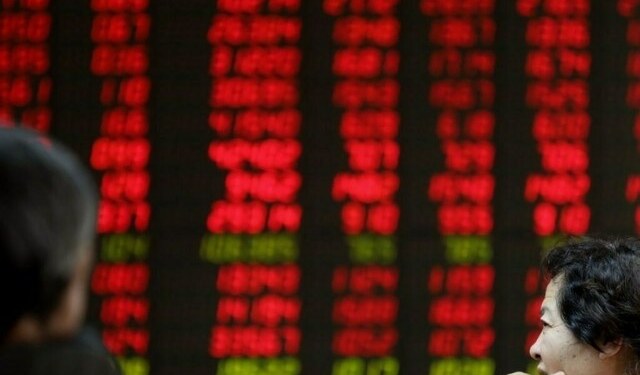LONDON: European stock markets mostly advanced Wednesday, though Madrid fell as Spain threatened to suspend Catalonia’s autonomy.
In early afternoon deals, Madrid’s IBEX 35 index was down 0.3 percent, while the euro fell versus the dollar.
Spain said Wednesday it would take the unprecedented step of seeking to suspend Catalonia’s autonomy if the region’s leader does not abandon his independence bid, on the eve of his deadline to give a final answer.
Elsewhere in Europe, London’s benchmark FTSE 100 index was up 0.3 percent as traders digested official data showing British unemployment sticking to a 42-year low point.
Sterling fell with markets not certain on whether the Bank of England will raise interest rates next month despite rising British inflation.
“The UK is a key focus for markets this week as traders try to determine whether or not the Bank of England will follow through on warnings that interest rates could rise at an upcoming meeting,” said Craig Erlam, senior market analyst at Oanda trading group.
In Asia, Tokyo’s main stocks index ended up 0.1 percent at another 21-year high — but Seoul dropped 0.1 percent, and Taipei, Manila and Jakarta also turned negative.
Hong Kong edged 0.1-percent higher to rack up a fifth successive day of gains that have left it at a 10-year high, while Sydney and Wellington were both marginally higher.
Shanghai was up 0.3 percent. Chinese dealers are watching Beijing, where the Communist Party on Wednesday kicked off its once-a-decade congress to hand Xi Jinping a second five-year term, consolidating his already immense power at the helm of the world’s number-two economy.
Markets are hoping the leadership provides some idea about future policy, particularly in tackling the country’s titanic debt mountain and possible further liberalisation.
On Tuesday in New York, the Dow and S&P 500 stock indices closed at new all-time highs following solid results from big firms including Johnson & Johnson and Goldman Sachs, which reinforced confidence across trading floors.
However, some analysts are warning of a retreat before the end of the year, with Goldman citing the fate of US President Donald Trump’s tax plan as key.
Oil prices meanwhile rose following data showing a drop in US stockpiles and with the commodity continuing to get support from ongoing battles between Iraqi and Kurdish forces in the disputed northern Iraq province of Kirkuk.
Crude fields taken Tuesday by the Iraqi army accounted for more than 400,000 of the 650,000 barrels per day that the autonomous Kurdish region used to export in defiance of Baghdad.
Source: Brecorder.com



























